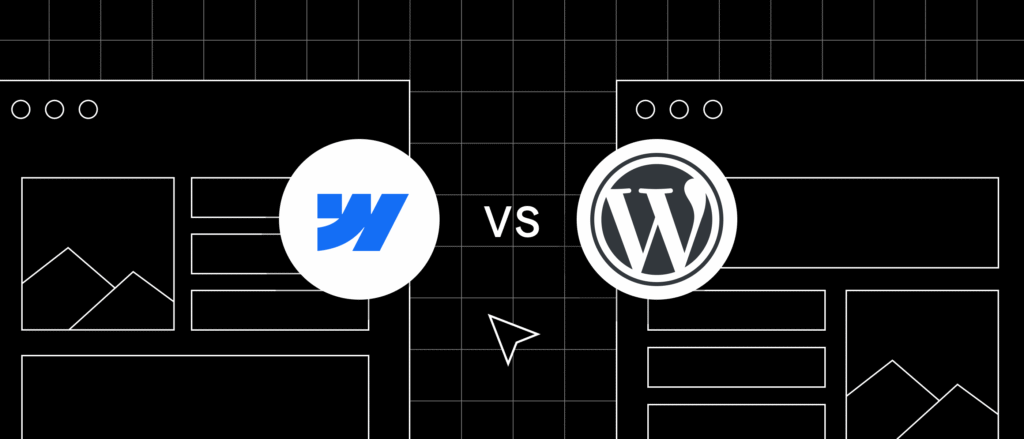In today’s fast-paced digital world, choosing the right website-building platform can determine the success of your online presence. Two of the most popular contenders in this space are wordpress-vs-webflow. Both platforms provide unique features, flexibility, and customization options, but they cater to different types of users and business needs. Whether you are a beginner, a designer, or a developer, understanding the differences in wordpress-vs-webflow will help you make the right decision for your website project.
The Basics of WordPress vs Webflow
When comparing wordpress-vs-webflow , it’s important to start with the basics. WordPress is a content management system (CMS) that has been around since 2003. It powers over 40% of websites worldwide, making it the most popular platform on the internet. On the other hand, Webflow is a relatively newer platform that has been gaining popularity for its visual web design capabilities and flexibility.

With wordpress-vs-webflow , you’re essentially deciding between a CMS-driven ecosystem (WordPress) and a design-focused, no-code/low-code builder (Webflow). Both are powerful, but the right choice depends on your skills, needs, and long-term goals.
Ease of Use: WordPress vs Webflow
One of the most critical factors when considering wordpress-vs-webflow is ease of use.
- WordPress: While WordPress is extremely flexible, beginners often find it overwhelming. You’ll need to install themes, plugins, and manage hosting on your own. However, once you get the hang of it, WordPress becomes incredibly powerful.
- Webflow: Designed for those who prefer a visual, drag-and-drop interface, Webflow allows you to design your website without needing to code. It is more intuitive for designers and those who want a real-time preview of their website.
In short, when weighing wordpress-vs-webflow , WordPress has a steeper learning curve, while Webflow is more user-friendly for visual designers.
Design Flexibility: WordPress vs Webflow
If design freedom is your top priority, the WordPress vs Webflow debate becomes interesting.
- WordPress: Offers thousands of themes (both free and premium) and page builders like Elementor, Divi, and WPBakery. While these tools provide a lot of flexibility, you may still feel limited if you want fully custom designs.
- Webflow: This platform is known for its design-first approach. You can create pixel-perfect, fully responsive websites without relying on pre-made templates. For creative professionals, Webflow often feels like the winner in the WordPress vs Webflow contest.
SEO Capabilities: WordPress vs Webflow
Search engine optimization (SEO) plays a crucial role in website success, making it an essential factor in WordPress vs Webflow.
- WordPress: With plugins like Yoast SEO or Rank Math, WordPress offers unmatched SEO flexibility. You can customize meta tags, sitemaps, schema, and more.
- Webflow: SEO features are built-in, allowing you to edit alt tags, meta descriptions, and URL structures easily. While it’s effective, it doesn’t offer the same deep customization options as WordPress.
When analyzing WordPress vs Webflow, WordPress often gets the edge for SEO enthusiasts, though Webflow is still highly capable for most needs.
Plugins and Integrations: WordPress vs Webflow
The WordPress vs Webflow discussion would be incomplete without mentioning integrations.
- WordPress: With over 55,000 plugins, WordPress is the king of extensibility. Whether you need e-commerce functionality, learning management systems, or booking software, there’s a plugin for it.
- Webflow: While it integrates with third-party apps like Zapier, HubSpot, and Google Analytics, its ecosystem is smaller compared to WordPress.
If plugins are important in your decision between WordPress vs Webflow, WordPress is the clear winner.
E-Commerce Options: WordPress vs Webflow
E-commerce is another area where the WordPress vs Webflow debate gets interesting.
- WordPress: With WooCommerce, WordPress provides one of the most popular e-commerce solutions globally. It’s highly customizable, but it does require setup and maintenance.
- Webflow: Webflow has a built-in e-commerce solution designed for visually stunning online stores. While it looks great, it’s still not as scalable or feature-rich as WooCommerce.
So, in the WordPress vs Webflow comparison for e-commerce, WordPress is better for larger, more complex stores, while Webflow suits creative small to medium shops.
Cost Comparison: WordPress vs Webflow
Budget is often a deciding factor in the WordPress vs Webflow decision.
- WordPress: The platform itself is free, but you’ll need to pay for hosting, themes, and plugins. Depending on your choices, costs can range from affordable to expensive.
- Webflow: Webflow pricing is subscription-based, with different tiers for individuals, businesses, and e-commerce. It can become pricey as your needs grow.
In terms of cost, WordPress vs Webflow depends on whether you prefer flexibility with potential hidden costs (WordPress) or transparent but higher pricing (Webflow).
Community and Support: WordPress vs Webflow
Community support is vital for long-term growth. In WordPress vs Webflow, the difference is clear.
- WordPress: With millions of users worldwide, there are countless tutorials, forums, and developers ready to help.
- Webflow: While its community is growing rapidly, it is still smaller compared to WordPress. However, its official support and tutorials are excellent.
When it comes to WordPress vs Webflow, WordPress has the advantage of a larger ecosystem, but Webflow shines with modern, high-quality support.
Final Verdict on WordPress vs Webflow
The WordPress vs Webflow debate doesn’t have a one-size-fits-all answer. Your choice depends on your priorities:
- Choose WordPress if you want maximum customization, plugin availability, and advanced SEO control. It’s ideal for bloggers, businesses, and large-scale websites.
- Choose Webflow if you prioritize visual design, ease of use, and modern web-building without coding. It’s perfect for designers, startups, and small businesses that want a polished online presence quickly.
Ultimately, when considering WordPress vs Webflow, the decision lies in your goals, technical skills, and budget. Both platforms are powerful, and either one can help you build a successful website if used effectively.




